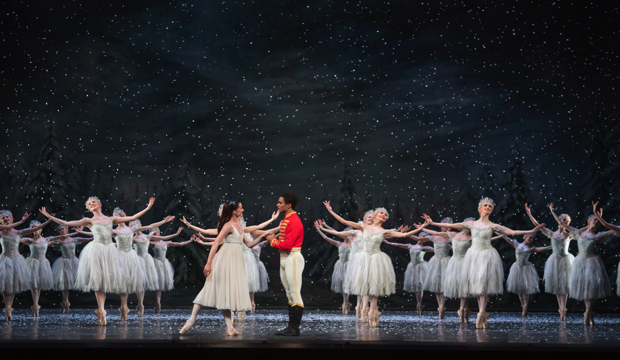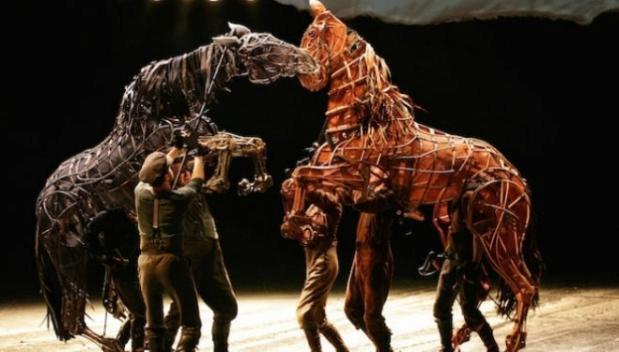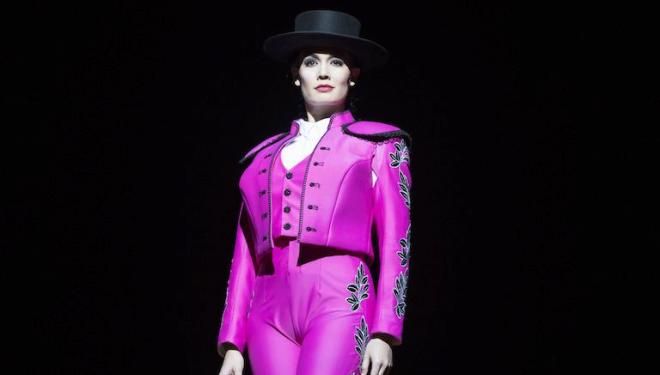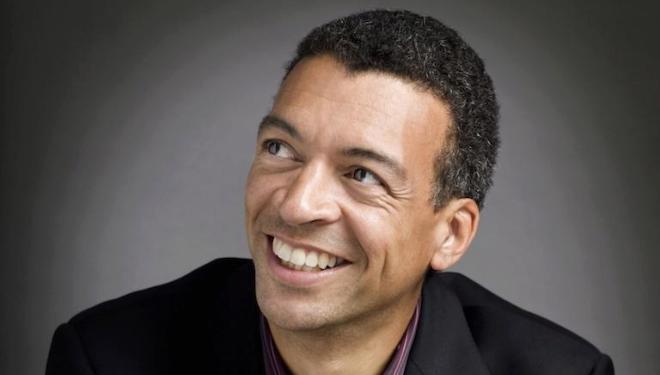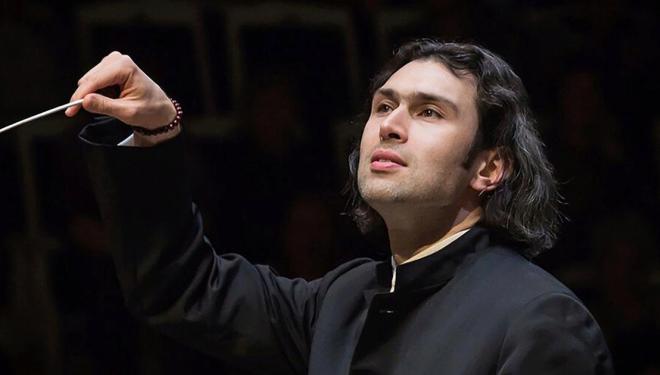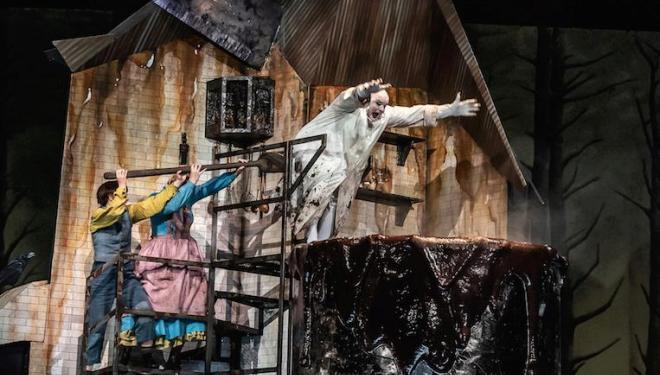
In the best pantomime or clown tradition, the mishap is avoided time and time again, as the audience winces with delight at the prospect of the inevitable. And of course it is not the boisterous brother and sister who eventually send lunch flying, but the furious mother who lashes out at them for larking about when they should be working.
Antony McDonald's new production for Covent Garden is packed with such affectionate and knowing references to the world of entertainment, notably in the Act II dream sequence, an enchanting cavalcade of fairy tale characters – Snow White, Red Riding Hood, Cinderella et al – with their own danced stories interacting and overlapping.
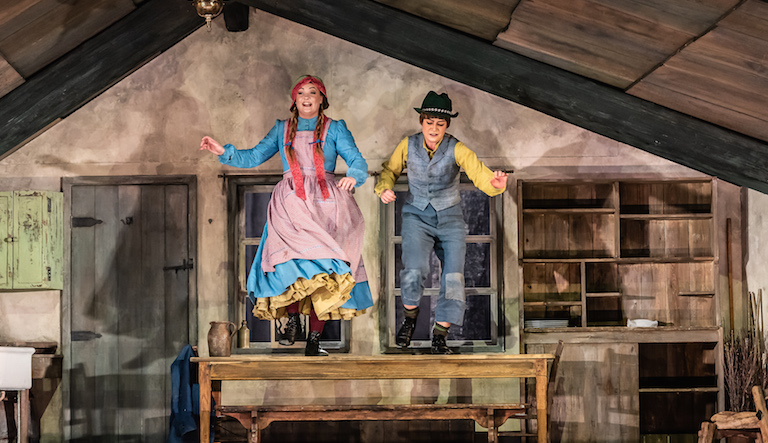
Jennifer Davis and Hanna Hipp as Gretel and Hansel dance around the milk jug. Photo: Clive Barda
By Act III the spotlight is turned on the cinema, with a lurching Psycho Bates Motel for the witch's gingerbread house, its edible railings and rocky road steps irresistible to the hungry youngsters. Inside, the monstrous Witch, who fattens up children and bakes them into gingerbread, is sung by tenor Gerhard Siegel, a pantomime dame who does the traditional strip to get down to her baking overalls.
Hansel and Gretel live in rural poverty, but in the vivid overture that is familiar as a standalone concert piece, we glimpse the family in more bountiful times, tucking into hunks of meat and mountains of noodles. But when the curtain rises on reality, lunch is a ladle of soup and the colour has drained out of life. Home is a dishevelled hut in the pine forest, that central character in German art, both reassuringly constant and alarmingly immutable.
McDonald has designed this production too, selecting the thick pastels of 19th-century storybooks and monochrome of German woodcuts. The look is both homely and opulent – pantomime again – the Act II forest a topsy-turvy place of magic and creeping creatures, where the deer hunts with a gun, the fox wields an axe and Red Riding Hood's wolf ends up with Snow White's poisoned apple.
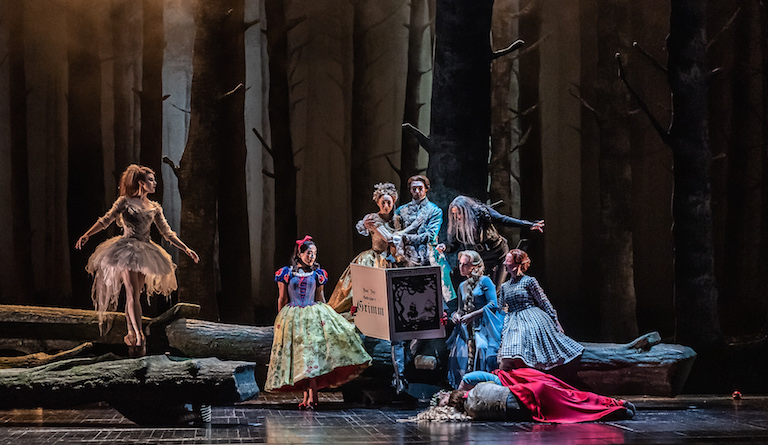
Favourite characters in the tales of the Brothers Grimm tumble into the dreamworld of Hansel and Gretel. Photo: Clive Barda
A real-life brother and sister were behind the opera, which has been a favourite since its first performance in Weimar in 1893. This was conducted by the composer Richard Strauss, the translucence of whose own music this score at times recalls. (The next year Gustav Mahler conducted the Hamburg premiere; Hansel and Gretel attracts music royalty.)
It was the German writer Adelheid Wette who asked her composer brother Englebert Humperdinck to set to music some songs she had written, based on the Hansel and Gretel fairytale by the Brothers Grimm. Real-life brothers and sisters in the audience will recognise an authentic mix of bickering and affection no doubt based on the creators' own childhood.
Mezzo-soprano Hanna Hipp, marvellous earlier this year in Garsington Opera's five-star Capriccio, sings Hansel and nips around the stage like a 10-year-old, dancing away the hunger with Gretel, sung by the soprano Jennifer Davies. Sebastian Weigle in his debut conducting the Orchestra and Chorus of the Royal Opera House works at keeping the players down in this lush score, but the singers are set quite far back, which can affect the balance.
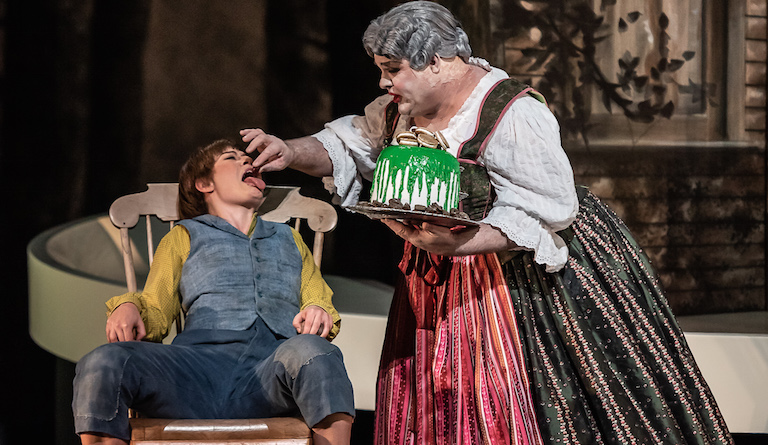
The Witch (Gerhard Siegel) feeds up Hansel (Hanna Hipp). Photo: Clive Barda
In one of those exciting, last-minute cast changes that invariably win the hearts of audiences, baritone Eddie Wade stepped in at an hours' notice to sing the role of Peter, the children's father, on the first night, singing with the warmth of his character; the softer of the two parents, both amorous and volatile after a drink or three, and keeling lightly with his best friend, the bottle. James Rutherford is due to sing the remaining performances.
There was gorgeous singing from Christina Gansch as the Dew Fairy, waking the forest with her little watering can, under a twirling umbrella. Isabella McGuire Mayes is every little girl's idea of a dancing fairy, presiding over the forest's night-time antics. Lucy Burge's choreography, both in the ballet sequences and in the children's quirky numbers, is delicious stuff.
With so few performances this season, all eyes will be on this wholesome production's scheduled return, with a new English translation, in 2020. A fitting companion to ballet's Nutcracker tradition, it has the potential to be at the heart of the Royal Opera Christmas for years to come and to be the show that opens up the world of opera to a whole new generation. Now that's real magic.
'Hansel and Gretel' is sung in German with English surtitles. Suitable for children aged six and over.
| What | Hansel and Gretel review , Royal Opera House |
| Where | Royal Opera House, Bow Street, Covent Garden, London, WC2E 9DD | MAP |
| Nearest tube | Covent Garden (underground) |
| When |
13 Dec 18 – 29 Dec 18, 17 & 27 Dec, 7:30PM; 21 Dec, 12:30PM; 29 Dec,11:30AM |
| Price | £5-£97 |
| Website | https://www.roh.org.uk/productions/hansel-and-gretel-by-antony-mcdonald |

